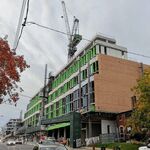Mr Finish Line
Active Member
I said "most" urbanists to leave space specifically for JacobsI mean, to point out the obvious, Jane Jacobs is probably the most important urbanist of the last 150 years. She gave us genuine insight. Beyond that, there is a big difference between what planners believe and what council approves. This is a problem across Canada and London is no exception. I don't know for sure, but I would guess there is a difference between the personal beliefs of London city planners and what they are able to achieve democratically at this moment in time (let alone 10 years ago).
With regards to city finances. This is exactly what I mean. They are a 1950s built form. It's hard to keep your head above water with that infrastructure to tax base ratio. They're scrambling to spend federal money for the BRT, which is unconscionable, but from a Macro perspective, they are trending towards improvement. The Netherlands has more people than all of Ontario with relatively tiny geographic footprint. Roughly London to Bellville to Owen sound. Their infatuation with car focused planning was a blip on the radar compared to a city like London. They aren't analogous in any way, although we can learn a lot from them. We also need home grown solutions for our specific post war problems. Good, reliable, and frequent suburban bus service is one of these things.
Getting back on track, I'm skeptical about frequent suburban bus service being a high priority solution. I'll admit I don't know the London suburbs well, but presumably they're the same as every other suburb here, and in that case very few people are within a reasonable walk from a bus stop. Frequent suburban bus service is very expensive to operate because the people are so spread out, look at YRT and it's fare recovery ratio compared to the TTC's. I think improving transit speed/reliability and frequency on core routes with better density will be more effective to boosting the city overall. This means getting cars out of the way of buses.




